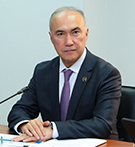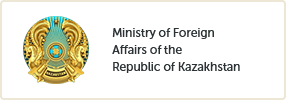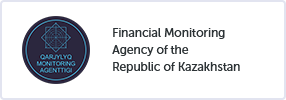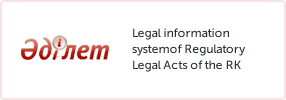The blog of the Ombudsman for the Protection of the Rights of Entrepreneurs of Kazakhstan was created for you to have an opportunity to appeal directly to me and I hope that it will contribute to a constructive dialogue between us – send me feedback, share opinions, make suggestions. All your comments without exception will be read by me.
What does it take to improve the business environment?
How Atameken interacts with business.
This year was not easy for business: the pandemic revealed all the weaknesses. There is a need to change the regulatory policy, develop a new regulatory framework for SMEs, President Kassym-Zhomart Tokayev, spoke about this in his message. He assigned a special role to entrepreneurship: any illegal interference in business activities, according to him, should be considered as a crime against the state.
This year, the National Chamber of Entrepreneurs “Atameken” celebrates the 7th anniversary of its launch. Now NCE plans to move away from the classic model of chambers and launches three projects – “New Model of Law Examination,” “Business Petitions” and “Atameken Lenta.” Nuraly Bukeikhanov, Head of the NCE “Atameken” administration, spoke about what they will give to business.
Inbusiness.kz asked representatives of the business community to talk about their experience of interacting with the Chamber, which industry problems have been resolved and which still need to be addressed. And, in general, share the vision - what is needed to improve the business environment.
Rustam Zhursunov, the Ombudsman for the Protection of the Rights of Entrepreneurs of Kazakhstan:
I think last year was successful for business. The number of operating small and medium-sized businesses increased by 11% and amounted to 1.3 million.
A number of issues of concern to the business were resolved. More precisely, a set of measures has been adopted to improve regulatory, control and supervisory mechanisms. A mechanism for pre-trial settlement of disputes in the tax and customs sphere was introduced. The number of entrepreneurs' appeals to courts decreased by 20-30%.
During the state of emergency “Atameken” closely cooperated with business. With the support of the chamber, businessmen were able to get a deferral for paying taxes and social payments, for repaying loans, and experts from regional chambers, together with local executive bodies, acted as mediators in resolving lease disputes at the local level. Tax control was also suspended.
The contact center of NCE “Atameken” (1432) received about 250 thousand calls (150 thousand unique calls) only in the period from January to the beginning of September this year.
Over the years, the National Chamber has earned the trust of business and has shown the effectiveness of its work. Nowadays, businessmen, turning to the Chamber of Entrepreneurs, know that they will receive help and advice. Without exaggeration, I can safely say that the Chamber of Entrepreneurs has harmoniously blended into the system of state and social structure of Kazakhstan in such a short time. We have shown how you can make a highly effective organization.
Great hopes were pinned on the institute of business ombudsman, which, in turn, managed to establish work with the regions. Last year, the signing of roadmaps with regional Akims began, which reflected regional business problems. Full interaction has been established with all law enforcement agencies.
Significant changes have been made to the procedures for registering reports of criminal offenses. The registration of criminal cases in the economic sphere has decreased eight times. Also, an analysis of the control and supervisory functions of government agencies and an analysis of legislation for barriers to entrepreneurial activity was carried out.
Agreements on mutual assistance and cooperation were signed with the business ombudsmen of Russia, Uzbekistan and Georgia.
If we talk in numbers about the work of the chamber, then the NCE conducted an examination of more than 33 thousand draft regulatory legal acts, 495 new requirements for business were rejected, 799 requirements were reduced, 514 systemic barriers were eliminated.
As for the legislative work, it has become a good practice when the Ministry of National Economy, together with the National Chamber, annually conducts large-scale work to radically improve the business environment.
To date, with the direct participation of “Atameken,” “8 packages” of legislative amendments have been adopted, aimed at improving the regulation of entrepreneurial activity, including improving the position of Kazakhstan in the international rating “Doing Business”.
In addition, the National Chamber took part in the work on other bills that are important for business.
For example, in the work on a new Administrative Procedure Code, which introduces a fundamental approach to ensure the protection of rights and freedoms, individuals and legal entities from illegal actions of state bodies. The possibility of appealing the results of the consideration of the complaint in the administrative justice. This is a fundamentally new conduct of the process by the judicial authorities. All these and other innovations will come into force on July 1, 2021.
Atameken takes an active part in the consideration of the draft Environmental Code in the new edition. The project was developed as part of the implementation of the message of the first President of the Republic of Kazakhstan, Nursultan Nazarbayev, to the people of Kazakhstan “New opportunities for development in the context of the fourth industrial revolution” and provides for a radical change in state policy in the field of environmental protection. These changes include the transition of enterprises (large natural resource users) to integrated environmental permits and the introduction of the best available technologies, a revision of the approach to environmental impact assessment, etc.
The Chamber also took an active part in the consideration of draft laws on consumer protection; transfer of government functions to a competitive environment; improvement of rehabilitation and bankruptcy procedures; on amendments and additions to the Code of the Republic of Kazakhstan on Administrative Offenses, as well as on other bills.
It is also necessary to note the active participation in the work of the Parliament, during the last session the NCE took part in the discussion on 71 draft laws.
Regulation “from scratch,” which the president spoke about in his message, implies a radical revision of the entire array of state regulation by changing the basic approaches to regulatory policy.
First, all requirements should be audited. And we have 13512 of them, and that's not counting the requirements contained in technical regulations and SNPs.
Second, an audit of the accounts should be carried out. There are also a lot of problems in this direction: the lack of complete transparency and integration of the databases of government agencies among themselves, the facts of duplicate requests for the same information from different government agencies. Full automation of all types of reports and information is required.
Thirdly, a reform of state control is needed. At the same time, it is advisable to completely revise the risk management system and checklists from scratch. There are two levels of risk in Kazakhstan - high (inspections and professional control with a visit) and insignificant (unscheduled inspections on complaints). In Russia, for example, objects of control are divided into six risk categories (extremely high, high, significant, medium, moderate, low), the risk assessment is carried out on the basis of information about the good faith of the controlled entity, which, in addition, has the right to apply for a change in its risk category... In addition, there must be an effective mechanism for compensation for harm caused by the misconduct of controllers, including lost profits (lost income).
Fourth, an audit of the permitting system is required. Currently, the Law of the Republic of Kazakhstan “On Permits and Notifications” contains 287 permits (including 79 - licenses, 208 - permits of the second category).
An important issue is the introduction of a rating of customer focus of government agencies. There should be a third independent party that will give an objective assessment of the work of government agencies (availability of information for business, the state of sites, the provision of government services, etc.).
Saken Makhambetov, Chairman of the Council of the Association of Service and Energy Service Management Entities in the Housing Sector “Shanyrak”:
Our association has been working with Atameken since 2017. We found understanding and support on almost all issues. I would especially note the Department of Construction and Land Relations and the Committee for Construction and Housing and Utilities of the Chamber. The work is well-coordinated, not without rough edges, but they are more, let's say, of a procedural nature and arise due to the fact that “Atameken” acts as an intermediary between the state and business. The actions of officials are not always clear, so the chamber has to take responsibility for itself.
We have international projects. For example, the NCE at the embassy level helped us arrange a meeting with partners from Germany. Then we signed a trilateral memorandum, and within its framework the chamber provided us with premises and platforms for negotiations not only in the capital, but also in the regions. Organizing video conferencing is also expensive. This is a significant help in terms of resources.
If we talk about what intra-industry issues we were helped to solve, it should be noted that the problems in the industry are more related to the market participants themselves. I will not talk about the construction sector now, but in the housing and utilities sector the market has not been formed, it remained as a legacy from the Soviet Union. “Atameken” helped us to build business models, with training of heads of management bodies, transfer to market relations, attracted trainers and experts. Many things the community itself could not do or would do them for a very long time. The Chamber helped with the transfer of our sphere to the commercial plane.
The chamber also helped us with the elimination of unnecessary procedures in the field of maintenance and operation of houses, when registering a condominium, carrying out repair work related to the operation of the building, etc. “Atameken” participated in working groups, gave proposals, it was easier to reach officials through the chamber who develop regulations.
With the participation of NCE, our association has developed an industry qualification framework, professional industry standards. “Atameken” provided us with a platform and the help of experts who built bridges with officials from various ministries. And, this was done quite quickly.
Now in society there is an understanding that entrepreneurs are a special “caste,” they need an opportunity for implementation, and it should be provided by the state, and then the business will do it itself. A new business needs to understand in which areas it can put its efforts to make a profit and so that this contributes to the growth of a region or industry, depending on what it is aimed at. I would like government agencies, together with business, to identify such areas and calculate them from the point of view of risks. Here, the elements of planning, as stated by the president, would play a role (Kassym-Zhomart Tokayev instructed to create an agency for strategic planning and reforms with direct subordination to the head of state. - Ed.). This is the experience of developed countries that have not abandoned planning, but use market mechanisms in full.
For an established business, the most important thing is sales markets. It is necessary to expand them, for example, to Russia or other EAEU countries, to countries that are traditional partners of Kazakhstan. First of all, for non-primary products. The government itself and also “Atameken” should play a big role in promoting our products. We see that to some extent this is happening, but at the same time the presence of Russian business in our market is more noticeable than the presence of our business in the Russian one. If this imbalance is eliminated through teamwork, it will help our business grow.
Changes are also needed in terms of taxes and social benefits. The tax code was quite progressive for its time. But by now, some of the norms are outdated, and they need to be fundamentally changed. Probably, this is what the president was talking about: we need to change the approaches, the very meaning, the content of these norms. Perhaps the adoption of a new code is needed to make it more understandable, and the practice of its application does not take up as many resources as it does now.
Executive Director of the National Association of Designers of the Republic of Kazakhstan, Honorary Builder of the Republic of Kazakhstan, Myuash Bisarova:
Before the Chamber was created, the “Atameken” union existed, and then we already knew that such a platform was needed for business. Our association, which turns 10 this year, has been accredited by the NCE since 2013. Let me explain that we are engaged in the development of design and survey activities.
For seven years “Atameken” has become a link between business and government, one of its tasks is to represent and protect the interests of business entities. Together with the National Chamber, we worked out very important problems for the industry.
For example, we managed to achieve a revision of the cost of architectural supervision in construction, which is carried out by designers. The rates have not been revised since Soviet times. In 2018, the cost of this engineering service increased more than 10 times from 0.1-0.2%.
With the help of NCE, we have established a dumping threshold. The cost of the object is calculated not from the head, but according to established rates and prices. Previously, unscrupulous participants reduced prices unreasonably. If the object cost, conditionally, 10 million tenge, they dumped by 50-60%, reaching 70-72%. Because of this, dear designers and professionals were left without orders. Together with “Atameken,” we have established a dumping threshold from 2019: 15% for design, 10% for construction.
Also, a very important issue is collisions and discrepancies in the current regulatory legal acts and regulatory and technical documents. It is critically important for designers not to have them, therefore design is the first stage of work on a project, and expertise, construction and operation follow. When the project undergoes an examination, verification is carried out according to Sanitary Epidemiological Control and building codes. If a conflict arises, who will be responsible and redo the design and estimate documentation?
Just recently, our proposals were accepted, and sanitary epidemiological control came out with our amendments. NCE has a status, today, not a single law, normative legal act or normative and technical document is approved without the consent of the chamber. Professionals work in specialized associations, and thanks to the participation of “Atameken,” our proposals are considered.
We also propose to revise the content of standard government procurement contracts for design. Now, according to the legislation, the designer under the contract undertakes to develop high-quality design and estimate documentation in accordance with the current standard, the customer - to accept and pay. But how exactly to pay - a clear procedure is not spelled out. Today there are customers who do not pay until full execution, and the project is considered completed only after the examination. It turns out that the designers work for free.
Therefore, at the NCE site, we raise the issue so that payment is made in three stages: 30% - an advance on the actually completed scope of work, 65% - when the project is completed, 8% (5% for examination and there is another 3% bank security) - after a positive expert opinion.
The customer undertakes to transfer the design assignment with the accompanying initial data before concluding a contract with the designer. In practice, unfortunately, it is different. We propose that in the rules for the implementation of public procurement, the beginning of the design is indicated from the date of the provision of all initial materials by the customer, so that customers know that until they give us everything, we do not start design. Because otherwise, the designer may be listed as unscrupulous. If he wins the competition, he must conclude an agreement within 10 days, but how to conclude an agreement if the customer does not provide materials? If within 10 days the contract is not concluded, then the designer is recognized as unfair. We are forced to conclude an agreement to avoid this. We hope we can solve this problem.
And, we also hope that design will be included among the sectors most affected by the pandemic.
Elena Tumashova
More details: https://inbusiness.kz/ru/news/chto-nuzhno-dlya-uluchsheniya-biznes-sredy








